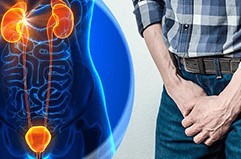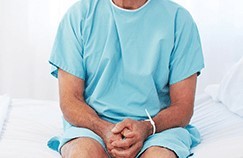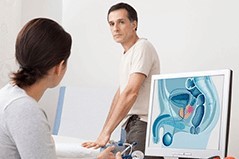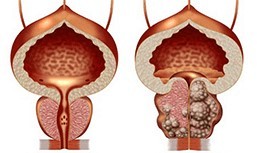Prostatitis - an inflammation of the prostate gland (the prostate gland), the organ that produces fluid secretion that is part of semen. Pathology, sometimes causing severe pain and problems with a potency. In the treatment of prostatitis is a reasonable amount to get started right away after the diagnosis.
Symptoms
Prostatitis usually affects men in the age group of 25 to 50 years of age. Outside, it is very common. The fact that they are suffering from one-third to one-half of all the people on the planet. The problem a lot of the symptoms:

- the man experiences discomfort, pain during urinating;
- the urine is of a slow, thin stream, it needs to be pressed;
- in the course of the night, and at other times of the day, there is often a desire to urinate. Can't shake the feeling that it is not all urine has left the bladder;
- the urine is turbid, mixed with blood;
- pestering pain in the lower abdomen, back, inner thighs, perineum (between the scrotum and the anus);
- it is also haunted by the pain and discomfort in the testicles, the penis;
- ejaculation is the place the pain;
There are often symptoms of prostatitis, which is similar to the common cold (low grade fever, chills). They are characteristic of the bacterial species in the disease (more on that below).
Reasons
Prostatitis often occurs in men who have previously suffered from the disease. The problem leads to a:
- an infection of the bladder and the urethra;
- HIV and other diseases that male gets infected during sexual intercourse;
- trauma to the pelvis - a fall from a bicycle, and horseback;
Causes of prostatitis in men the catheter into the urethra to drain urine from the bladder.
Pathology sometimes occurs after a biopsy of the prostate gland, when the analysis is taken a sample of her tissue. In this procedure, the symptoms of prostatitis in men is rare.
Complications
Since prostatitis may be:
- an inflamed appendage testicles (epididymitis);
- to a large extent, reduced sperm count, infertility can ensue;
- it popped an abscess (cavity with pus).

A number of research studies do not reveal a direct link between prostatitis and prostate cancer.
The types of prostatitis
At a prostatitis in 5 main types: chronic and acute non-bacterial, chronic bacterial, asymptomatic.
- Chronic, non-bacterial (also referred to as chronic pain syndrome in the pelvic region). The most common (more than 90% of all patients have them). The symptoms of prostatitis are unstable, they come and go. The pathogens in the body are not to be found. The diagnosis is made if at least 3 months, a man suffering from pain in the pelvis, discomfort during urination, and the other of the above mentioned symptoms. The exact cause of the condition is unknown, but most likely, it is referred to as:
- neurological problems (neuropathy);
- the irritation of the prostate gland, which leads to poor outflow of urine from the bladder;
- problems with the pelvic floor muscles (dyssynergia);
- abnormal, but, unknown to science, virus, bacteria.
- The acute non-bacterial. There is a chronic pain syndrome in the pelvic region, the constant problems with the toilet.
- Acute infectious. The most serious form of the disease. Uncommon. Generated:
- Escherichia coli, Staphylococcus and other bacteria;
- sexually transmitted diseases (chlamydia, gonorrhea);
- by the fungus Candida.
- A chronic infectious. Pathology may not be seen for a couple of years ago. The symptoms are similar to acute bacterial kind, but it proved to be, not so much.
- Asymptomatic. Discovered by accident. The signs and symptoms are absent. It shows signs of inflammation, and the blood has a high concentration of prostatospecific antigen.

The symptoms are the rise fast. Discomfort in the pelvis is contributing to the pain in the genital area, fever, nausea, burning pain when urinating. Acute bacterial prostatitis can cause a serious, life-threatening complications - abscesses, inability to urinate, low blood pressure.
The diagnosis
The diagnosis is made by:
- a digital rectal examination;
- the urine is tested. They need to determine if a prostate infection;
- blood. Check the level of the prostatospecific antigen. The test revealed signs of inflammation;
- Ultrasound of the genitourinary system. It is assigned when the above-mentioned tests, the correct diagnosis is not enough. Ultrasound of the prostate, it is better to be done through the anus (transrectally method).
Also, sometimes the physician examines the prostate gland secretion. To get, massaged the gland.
May be assigned analyses in a variety of venerologic of the infections that are the cause of the inflammation of the prostate gland.
A professional diagnosis will help to prescribe the correct treatment of prostatitis in men.
The treatment of the
If the prostatitis is bacterial, your doctor prescribes:
- Antibiotics. Their appearance depends on the set of bacteria. The drugs you have a month and a half. If the symptoms are very severe, antibiotics are administered intravenously in urgent need of.
- The alpha-blockers. Tools to relax the muscles of the bladder to the point where it joins the prostate. Removed pain during urination.
- Analgesics - nonsteroidal anti-inflammatory drugs.

It is impossible to prescribe drugs independently. Only a doctor determine how to treat prostatitis.
To prevent
In order to prevent prostatitis:
- take a warm sitz bath;
- it is used for to reduce the abdominal, or the back warmer-a pillow;
- stop drinking alcohol, caffeine, foods that increase the acidity (spicy, salty);
- consume lots of liquids (unsweetened). So, we flush the urinary system, the bacteria will not have time to multiply;
- I will try it for a long time not to ride your bike for a long time to do;
- not sure about the good hygiene of the penis, perineum;
- the use of birth control;
- sport. Simple cardio exercises will be enough - starting to jog, to swim in the pool, do a light workout.
Prevention of prostatitis should be a part of a way of life. Simple ways to protect your body.

































